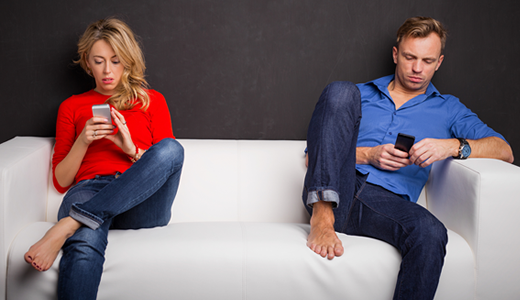Maybe you can relate to this scenario:
It’s pretty late in the evening. Say, 9:37. (Give or take.) You’ve just put your last child to bed. You’ve been going nonstop since, say, 5:23 this morning, when you inexplicably woke up seven precious minutes before your alarm rang.
You plop down on the couch next to your spouse. Perhaps he or she is watching the news. Or some reality show. Or something. You know that you should probably talk about how the day went, how the week is going, what’s going on this weekend, when the kids’ next recital or orthodontist appointment is. Etc., etc.
But, well, the second you sit down, your right hand reaches for your smartphone. Somehow, it’s just an arm’s reach away. You pick it up. Just for a moment, you know. To check Facebook. Or your stocks. Or your home’s value on Zillow. Or Pinterest. Or a zillion other things.
Soon, your realize 18 minutes have passed. It’s now 9:55. You look over at your significant other. And she’s doing the same thing you are: casually, mindlessly, hypnotically, habitually flicking through her Facebook feed. Just like you.
She notices you’re looking at her. “Hey,” you say wearily and a bit sheepishly. “Hey,” she replies.
And then you both go back to your phones.
Soon it’s 10:23. The weather on the local news is done. And your days of staying up together and watching some late-night talk show are far in the rearview mirror. (Sorry Jimmy. And Jimmy. And that other guy.)
“You doin’ OK?” you ask a bit sheepishly.
“Yup.”
“Should we go to bed?”
“Yup.”
You know that that level of emotional intimacy probably ain’t gonna cut it for the long haul. But for tonight, well, it’ll have to do. And after all, all that stuff online was pretty important.
Maybe you can relate to that story. Maybe not. But the point here is that married couples have precious little quality time together. And the advent of our love affair with smartphones has only made fleeting moments of it at the end of the day even harder.
So much so that there’s now an official term for choosing to spend time with that little screen instead of on our beloved: phubbing.
It’s short for “phone snubbing,” a contraction that’s as inelegant as the behavior it describes.
Now, occasionally choosing to see what’s happening online instead of talking to our spouses isn’t going to torpedo our marriages overnight. But when it becomes an ongoing habit, well, it can wreak quiet havoc on kindling a connection with the person to whom we’ve pledged our life.
According to an article published on the Australian women’s website whimn.com.au, a recent study from Baylor University found that 46% of those surveyed felt they’d been “phubbed” at some point by their partner. Australian relationship expert Julie Harte of The Harte Center said of the study:
There are three important connection factors that will give us a sense of satisfaction in our relationships. The first one is accessibility, that you’re both open and listening to one another. The second is responsiveness, as in you both empathize and try to understand how the other feels, as in ‘get’ each other, and the third is engagement, so you’re both making the time to be fully attentive to each other.
“Phubbing interferes with all three of these important factors so it’s no surprise to me that people are feeling less satisfied with their relationships because they’re just not having quality time, and they’re not feeling their partner ‘gets’ them or is there for them because there’s always this constant distraction away.”
She went on to talk about how this is a growing problem among couples she counsels:
“I have more and more people, couples—one or both partners—coming to me and saying, ‘My partner is constantly on their device and there is no time for me, I feel so completely unimportant in their life.’ … “It implies that ‘you’re not really that important to me, I will never put you first over other things and that there will never be a time when I choose you over my phone.'”
Now, checking your Facebook feed instead of checking in with your spouse at the end of a long day might not seem a particularly pernicious problem. Surely there are more destructive addictions. (And there are.) Nevertheless, I think Harte is right to note that when we choose technology over being present, available and engaged with our spouses, it may be doing damage over the long haul that we’re not aware of.
And she doesn’t even begin to address how this phenomenon may be affecting our children, too.
So what steps can those of us who are tempted to phub take to break this 21st-century bad habit? Harte offers some practical advice: “Sit down together and set out some rules about phone-free time, where you basically put your phone away somewhere where you can’t hear it, for a full hour every night while you and your partner spend some quality time together. … Most people would be amazed at what a dedicated hour a day of phone-free time can do for their relationship over time.”
I think that’s great counsel. And, as Christians, I’d add that perhaps it’s a way of life we need to talk about with God, too—both in our individual relationships with him and together with our spouses as well.
The goal here is not draconian rules about this new-fangled device. Rather, it’s recognizing that our relationships with the partner right in front of us is the one that matters most. To protect and cultivate it, we’ll have to make concrete, intentional choices to establish healthy boundaries on technology.
Because let’s face it: I don’t think any of us want to be labeled a phubber.






Recent Comments